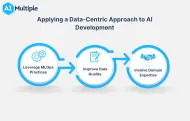4 Ways AI is Revolutionizing The Field of Surgery in 2024
Surgery is one of the most crucial areas in the field of medicine and is being performed for centuries. Being one of the most common and effective methods of treatment, surgery comes with various complications. Many surgeries fail due to reasons such as human errors, unknown reactions of the body, or inadequate equipment.
For example, spinal disc surgeries have a failure rate of more than 50%. A recent study estimated that about 7-15% of patients who undergo surgery face post-operative complications which range from non-significant to fatal outcomes.
Healthcare professionals are leveraging digital solutions such as AI to improve current surgical procedures. This article highlights 4 ways AI is revolutionizing the field of surgery to help healthcare professionals and business managers in making better future decisions regarding its implementation.
AI-enabled preoperative planning
Preoperative or pre-surgical planning refers to the plan that surgeons create of how the procedure will be done. This process is based mainly on historic methods and data of similar surgeries performed. AI can help improve this process.
For example, a study on AI-based preoperative planning for knee arthroplasty (surgery), found that the technology made the process more efficient.
This is how it works:
AI-enabled intraoperative assistance
This is another popular application of AI in the field of surgery. As mentioned before, surgeries have various complications that can impact the life of the patient. This impact is called surgical trauma. Minimally invasive surgery (MIS) is a combination of techniques and technologies in which the trauma caused by the surgery is reduced to a minimum. MIS procedures are increasingly being used with AI-enabled robotic assistance.
As the potential for robot-assisted surgeries is realized, healthcare professionals are investing more in the technology. The global market is projected to increase from $4B in 2022 to about $18B by 2030.
For example, a study by Harvard Medical School presented that some of the benefits of a robot-assisted prostate cancer surgery include a shorter recovery period, lower post-surgery pain, and fewer post-surgery complications.
Watch how robotic assistance is making knee replacement surgery more accurate and efficient.
Robot-assisted surgery enabled with AI and computer vision is also helping improve spinal surgery which is a high-risk and difficult procedure.
AI for avoiding surgery
Surgery has many complications attached to it, that is why healthcare professionals do not use it as the first resort. There are some diseases, which can be treated without surgery if detected earlier. For example, peripheral artery disease (PAD) is difficult to detect and in late detection can require surgical amputation of the limb.
Early detection of PAD through AI can help avoid surgical amputations. The National Health Service (NHS) of the UK has initiated a program called Accelerating Detection of Disease (ADD) which will leverage big data and AI to develop solutions for the early detection and anticipation of illnesses in the UK.
See how AI can enable early detection of sepsis:
AI-enabled remote surgery
Remote surgery is another way AI is improving the field. Sometimes the surgeons can not be in the same place as the patient, whether because the patients are in remote areas or is in isolation due to a global pandemic. Remote surgery can help overcome these challenges.
With remote surgery, the surgeon can use surgical robots through a computer or controlling platform to perform surgery while being away from the patient.
While this technology is not common, healthcare facilities are starting to adopt it.
The Da Vinci surgical robot system offers remote surgery with higher accuracy and less invasiveness.
You can also check our data-driven lists of:
Further reading
- Top 18 Healthcare AI Use Cases
- Top 4 AI Use Cases in the Pharmaceutical Sector
- 4 Ways AI is Revolutionizing The Radiology Sector
- AI in X-ray Analysis: Benefits and Challenges
- Top 4 Challenges of AI in Healthcare & How to Overcome Them
- Top 7 Computer Vision Use Cases in Healthcare
If you have questions, feel free to contact us:



Comments
Your email address will not be published. All fields are required.